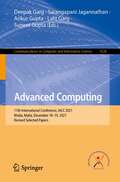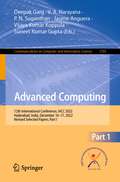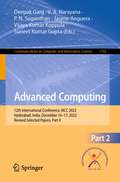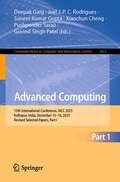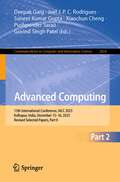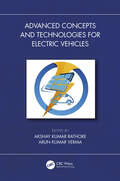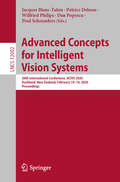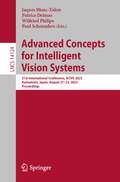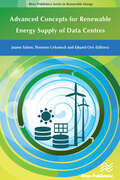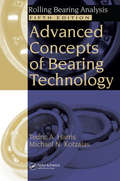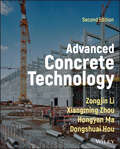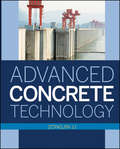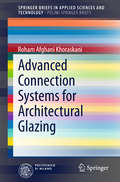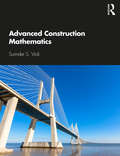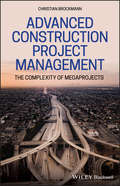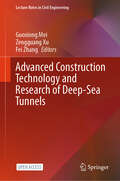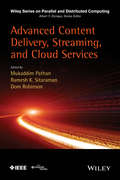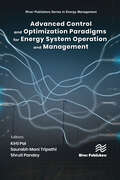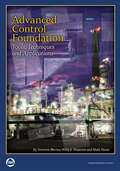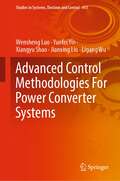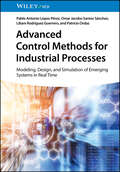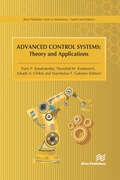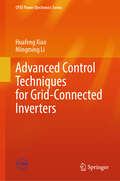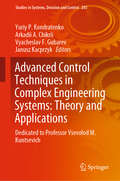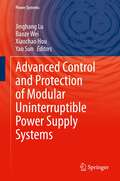- Table View
- List View
Advanced Computing: 11th International Conference, IACC 2021, Msida, Malta, December 18–19, 2021, Revised Selected Papers (Communications in Computer and Information Science #1528)
by Ankur Gupta Deepak Garg Lalit Garg Sarangapani Jagannathan Suneet GuptaThis volume constitutes reviewed and selected papers from the 11th International Advanced Computing Conference, IACC 2021, held in December 2021.The 47 full papers and 4 short papers presented in the volume were thorougly reviewed and selected from 246 submissions. The papers are organized in the following topical sections: application of artificial intelligence and machine learning in healthcare; application of AI for emotion and behaviour prediction; problem solving using reinforcement learning and analysis of data; advance uses of RNN and regression techniques; special intervention of AI.
Advanced Computing: 12th International Conference, IACC 2022, Hyderabad, India, December 16–17, 2022, Revised Selected Papers, Part I (Communications in Computer and Information Science #1781)
by Jaume Anguera Deepak Garg P. N. Suganthan Suneet Kumar Gupta V. A. Narayana Vijaya Kumar KoppulaThis two-volume set constitutes reviewed and selected papers from the 12th International Advanced Computing Conference, IACC 2022, held in Hyderabad, India, in December 2022.The 72 full papers and 6 short papers presented in the volume were thorougly reviewed and selected from 415 submissions. The papers are organized in the following topical sections: AI in industrial applications; application of AI for disease classification and trend analysis; design of agricultural applications using AI; disease classification using CNN; innovations in AI; system security and communication using AI; use of AI in human psychology; use of AI in music and video industries.
Advanced Computing: 12th International Conference, IACC 2022, Hyderabad, India, December 16–17, 2022, Revised Selected Papers, Part II (Communications in Computer and Information Science #1782)
by Jaume Anguera Deepak Garg P. N. Suganthan Suneet Kumar Gupta V. A. Narayana Vijaya Kumar KoppulaThis two-volume set constitutes reviewed and selected papers from the 12th International Advanced Computing Conference, IACC 2022, held in Hyderabad, India, in December 2022.The 72 full papers and 6 short papers presented in the volume were thorougly reviewed and selected from 415 submissions. The papers are organized in the following topical sections: AI in industrial applications; application of AI for disease classification and trend analysis; design of agricultural applications using AI; disease classification using CNN; innovations in AI; system security and communication using AI; use of AI in human psychology; use of AI in music and video industries.
Advanced Computing: 13th International Conference, IACC 2023, Kolhapur, India, December 15–16, 2023, Revised Selected Papers, Part I (Communications in Computer and Information Science #2053)
by Deepak Garg Joel J. P. C. Rodrigues Govind Singh Patel Suneet Kumar Gupta Xiaochun Cheng Pushpender SaraoThe two-volume set CCIS 2053 and 2054 constitutes the refereed post-conference proceedings of the 13th International Advanced Computing Conference, IACC 2023, held in Kolhapur, India, during December 15–16, 2023.The 66 full papers and 6 short papers presented in these proceedings were carefully reviewed and selected from 425 submissions. The papers are organized in the following topical sections:Volume I:The AI renaissance: a new era of human-machine collaboration; application of recurrent neural network in natural language processing, AI content detection and time series data analysis; unveiling the next frontier of AI advancement.Volume II:Agricultural resilience and disaster management for sustainable harvest; disease and abnormalities detection using ML and IOT; application of deep learning in healthcare; cancer detection using AI.
Advanced Computing: 13th International Conference, IACC 2023, Kolhapur, India, December 15–16, 2023, Revised Selected Papers, Part II (Communications in Computer and Information Science #2054)
by Deepak Garg Joel J. P. C. Rodrigues Govind Singh Patel Suneet Kumar Gupta Xiaochun Cheng Pushpender SaraoThe two-volume set CCIS 2053 and 2054 constitutes the refereed post-conference proceedings of the 13th International Advanced Computing Conference, IACC 2023, held in Kolhapur, India, during December 15–16, 2023.The 66 full papers and 6 short papers presented in these proceedings were carefully reviewed and selected from 425 submissions. The papers are organized in the following topical sections:Volume I:The AI renaissance: a new era of human-machine collaboration; application of recurrent neural network in natural language processing, AI content detection and time series data analysis; unveiling the next frontier of AI advancement.Volume II:Agricultural resilience and disaster management for sustainable harvest; disease and abnormalities detection using ML and IOT; application of deep learning in healthcare; cancer detection using AI.
Advanced Concepts and Technologies for Electric Vehicles
by Akshay Kumar Rathore Arun Kumar VermaThis book explains the basic and advanced technology behind the Power Electronics Converters for EV charging, and their significant developments, and introduces the Grid Impact issues that underpin the grid integration of electric vehicles. Advanced Concepts and Technologies for Electric Vehicles reviews state-of-the-art and new configurations and concepts of more electric vehicles and EV charging, mitigating the impact of EV charging on the power grid, and technical considerations of EV charging infrastructures. The book considers the environmental benefits and advantages of electric vehicles and their component devices. It includes case studies of different power electronic converters used for charging EVs. It offers a review of PFC-based AC chargers, WBG-based chargers, and Wireless chargers. The authors also explore multistage charging systems and their possible implementations. The book also examines the challenges and opportunities posed by the progressive integration of electric drive vehicles on the power grid and reported solutions for their mitigation. The book is intended for professionals, researchers, and engineers in the electric vehicle industry as well as advanced students in electrical engineering who benefit from this comprehensive coverage of electric vehicle technology. Readers can get an in-depth insight into the technology deployment in EV transportation and utilize that knowledge to develop novel ideas in the EV area.
Advanced Concepts for Intelligent Vision Systems: 20th International Conference, ACIVS 2020, Auckland, New Zealand, February 10–14, 2020, Proceedings (Lecture Notes in Computer Science #12002)
by Jacques Blanc-Talon Wilfried Philips Dan Popescu Paul Scheunders Patrice DelmasThis book constitutes the proceedings of the 20th INternational Conference on Advanced Concepts for Intelligent Vision Systems, ACIVS 2020, held in Auckland, New Zealand, in February 2020. The 48 papers presented in this volume were carefully reviewed and selected from a total of 78 submissions. They were organized in topical sections named: deep learning; biomedical image analysis; biometrics and identification; image analysis; image restauration, compression and watermarking; tracking, and mapping and scene analysis.
Advanced Concepts for Intelligent Vision Systems: 21st International Conference, ACIVS 2023 Kumamoto, Japan, August 21–23, 2023 Proceedings (Lecture Notes in Computer Science #14124)
by Wilfried Philips Paul Scheunders Patrice Delmas Jaques Blanc-TalonThis book constitutes the proceedings of the 21st International Conference on Advanced Concepts for Intelligent Vision Systems, ACIVS 2023, held in Kumamoto, Japan, during August 2023. The 31 papers presented in this volume were carefully reviewed and selected from a total of 48 submissions. They were organized in topical sections named: Computer Vision, Affective Computing and Human Interactions, Managing the Biodiversity, Robotics and Drones, Machine Learning.
Advanced Concepts for Renewable Energy Supply of Data Centres
by Jaume Salom Thorsten Urbaneck Eduard OróThe rapid increase of cloud computing, high performance computing (HPC) and the vast growth in Internet and Social Media use have aroused the interest in energy consumption and the carbon footprint of Data Centres. Data Centres primarily contain electronic equipment used for data processing (servers), data storage (storage equipment), and communications (network equipment). Collectively, this equipment processes, stores, and transmits digital information and is known as information technology (IT) equipment. Advanced Concepts for Renewable Energy Supply of Data Centres introduces a number of technical solutions for the supply of power and cooling energy into Data Centres with enhanced utilisation of renewable energy sources in order to achieve low energy Data Centres. Because of the high energy density nature of these unique infrastructures, it is essential to implement energy efficiency measures and reduce consumption before introducing any renewable energy source. A holistic approach is used with the objective of integrating many technical solutions such as management of the IT (Information Technology) load, efficient electrical supply to the IT systems, Low-Ex air-conditioning systems, interaction with district heating and cooling networks, re-use of heat, free cooling (air, seawater, groundwater), optimal use of heat and cold storage, electrical storage and integration in smart grids. This book is therefore a catalogue of advanced technical concepts that could be integrated into Data Centres portfolio in order to increase the overall efficiency and the share of renewable energies in power and cooling supply. Based on dynamic energy models implemented in TRNSYS some concepts are deeply evaluated through yearly simulations. The results of the simulation are illustrated with Sankey charts, where the energy flows per year within the subsystems of each concept for a selected scenario are shown, and graphs showing the results of parametric analysis. A set of environmental metrics (as the non-renewable primary energy) and financial metrics (CAPEX and OPEX) as well of energy efficiency metrics like the well-known PUE, are described and used to evaluate the different technical concepts.
Advanced Concepts of Bearing Technology: Rolling Bearing Analysis, Fifth Edition
by Tedric A. Harris Michael N. KotzalasFor the last four decades, Tedric Harris' Rolling Bearing Analysis has been the "bible" for engineers involved in rolling bearing technology. Why do so many students and practicing engineers rely on this book? The answer is simple: because of its complete coverage from low- to high-speed applications and full derivations of the underlying mathemati
Advanced Concrete Technology
by Zongjin Li Dongshuai Hou Xiangming Zhou Hongyan MaAdvanced Concrete Technology A thorough grounding in the science of concrete combined with the latest developments in the rapidly evolving field of concrete technology In the newly revised second edition of Advanced Concrete Technology, a distinguished team of academics and engineers delivers a state-of-the-art exploration of modern and advanced concrete technologies developed during the last decade. The book combines the essential concepts and theory of concrete with practical examples of material design, composition, processing, characterization, properties, and performance. The authors explain, in detail, the hardware and software of concrete, and offer readers discussions of the most recent advances in concrete technology, including, but not limited to, concrete recycling, nanotechnology, microstructural simulation, additive manufacturing, and non-destructive testing methods. This newest edition of Advanced Concrete Technology provides a sustained emphasis on sustainable and novel technologies, like new binders, 3D printing, and other advanced materials and techniques. Readers will also find: A thorough introduction to concrete, including its definition and its historical evolution as a material used in engineering and construction In-depth explorations of the materials for making concrete and the properties of fresh concrete Comprehensive discussions of the material structure of concrete, hardened concrete, and advanced cementitious composites Fulsome treatments of concrete fracture mechanics, non-destructive testing in concrete engineering, and future trends in concrete Perfect for undergraduate and graduate students studying civil or materials engineering—especially those taking classes in the properties of concrete or concrete technologies—as well as engineers in the concrete industry. Advanced Concrete Technology, 2nd Edition will also earn a place in the libraries of civil and materials engineers working in the industry.
Advanced Concrete Technology
by Zongjin LiOver the past two decades concrete has enjoyed a renewed level of research and testing, resulting in the development of many new types of concrete. Through the use of various additives, production techniques and chemical processes, there is now a great degree of control over the properties of specific concretes for a wide range of applications. New theories, models and testing techniques have also been developed to push the envelope of concrete as a building material. There is no current textbook which brings all of these advancements together in a single volume. This book aims to bridge the gap between the traditional concrete technologies and the emerging state-of-the-art technologies which are gaining wider use.
Advanced Connection Systems for Architectural Glazing (SpringerBriefs in Applied Sciences and Technology)
by Roham Afghani KhoraskaniThis book presents the findings of a detailed study to explore the behavior of architectural glazing systems during and after an earthquake and to develop design proposals that will mitigate or even eliminate the damage inflicted on these systems. The seismic behavior of common types of architectural glazing systems are investigated and causes of damage to each system, identified. Furthermore, depending on the geometrical and structural characteristics, the ultimate horizontal load capacity of glass curtain wall systems is defined based on the stability of the glass components. Detailed attention is devoted to the incorporation of advanced connection devices between the structure of the building and the building envelope system in order to minimize the damage to glazed components. An innovative new connection device is introduced that results in a delicate and functional system easily incorporated into different architectural glazing systems, including those demanding maximum transparency.
Advanced Construction Mathematics
by Surinder VirdiAdvanced Construction Mathematics covers the range of topics that a student must learn in order to achieve success in Level 3 and 4 mathematics for the Pearson BTEC National and BTEC HNC/HND in Construction, Building Services, and Civil Engineering. Packed with easy to follow examples, its 18 chapters cover algebra (equations, transposition and evaluation of formulae), differentiation, integration, statistics and numerous other core concepts and their application in the construction/civil engineering field. The book explains technical processes before applying mathematical techniques to solve practical problems which gradually build in complexity. Each chapter contains self-test exercises and answers and numerous illustrations to simplify the essential maths required at Levels 3 and 4. The book is also a useful recap or primer for students on BSc or non-cognate MSc Construction and Civil Engineering degrees.
Advanced Construction Project Management: The Complexity of Megaprojects
by Christian BrockmannAn essential guide to the structure, dynamics, and management of construction megaprojects Advanced Construction Project Management is a comprehensive resource that covers the myriad aspects of implementing a megaproject from a contractor’s perspective. With many years’ experience of managing construction megaprojects, the author provides an in-depth exploration of the structure, dynamics and management of these demanding projects. In addition, the book gives all stakeholders a clear understanding of the complexity of megaprojects and offers contractors the insight and essential tools needed for achieving results. As the trend to plan and implement ever-larger projects looks likely to continue into the future, the need for a guide to understand the challenges of managing a megaproject couldn’t be greater. Comprehensive in scope, the book explores the theoretical background, economics, complexity, phases, strategic planning, engineering, coordination, and common challenges of megaprojects. The book also provides the tools for managing stakeholder integration. This important book: Describes the structure, dynamics and management of megaprojects Explores the management activities required and examines the appropriate tools for the management of megaprojects Includes tools for stakeholder integration Provides an advanced understanding of construction management concepts Written for managers, project managers and engineers, and cost consultants, Advanced Construction Project Management covers, in one complete volume, the information needed to lead a successful project.
Advanced Construction Technology and Research of Deep-Sea Tunnels (Lecture Notes in Civil Engineering #490)
by Guoxiong Mei Zengguang Xu Fei ZhangThis open access book focuses on cutting-edge construction techniques for deep-sea tunnels. A world leader in construction technology for deep-sea tunnels and large undersea engineering structures, China has in these years completed several world-renowned undersea tunnel projects, such as the undersea tunnel connecting Shenzhen and Zhongshan, and the Shantou Bay undersea tunnel. The nation also boasts mature technology and enviable scientific research achievements in large-scale shield technology and deep-sea soil hydrostatic surveying. This book intends to provide a review of relevant studies on deep-sea tunnel construction for civil engineers around the globe and equip scholars in related fields of research with a deeper insight into this domain through comprehensive analyses of real-world engineering cases and the most up-to-date research results. The topics of this book include but are not limited to the following:1. Deep-sea survey technology and equipment.2. Complex load characteristics and numerical simulation technology in the marine environment.3. Key technology of immersed tube and shield tunnel construction.4. Deep-sea construction equipment and safety assessment methods.5. Deep-sea positioning, measurement and control technology.
Advanced Content Delivery, Streaming, and Cloud Services
by Mukaddim Pathan Dom Robinson Ramesh K. SitaramanAs the subject area of CDN gains research interest and momentum, it is crucial to stay up-to-date with recent developments of its evolutionary track, as well as the current landscape and roadmap. This book provides performance models, case studies, business analyses, and several other important components, so practicing engineers and academics can use the text as a timely reference.* Provides an in-depth look at Cloud-based CDNs* Includes CDN and streaming media basics and tutorials* Aimed to instruct systems architects, practitioners, product developers, and researchers* Material is divided into introductory subjects, advanced content, and specialist areas
Advanced Control & Optimization Paradigms for Energy System Operation and Management
by Kirti Pal Saurabh Mani Tripathi Shruti PandeyDistributed energy technologies are gaining popularity nowadays; however, due to the highly intermittent characteristics of distributed energy resources, a larger penetration of these resources into the distribution grid network becomes of major concern. The main issue is to cope with the intermittent nature of the renewable sources alongside the requirements for power quality and system stability. Unlike traditional power systems, the control and optimization of complex energy systems comprising of wind, solar, thermal, and energy storage becomes difficult in many aspects, such as modelling, integration, operation, coordination and planning etc. This means that energy conversion as per the standards imposed by the energy market is unachievable without adequate control, management, and optimization.This edited book serves as a resource for the engineers, scientists and professionals working on distributed energy systems. The book is an extensive collection of state-of-the-art studies on advanced control paradigms for complex energy systems, with emphasis on the optimization and management of the high penetration of distributed energy resources into power distribution networks. Readers will find the book inspiring and useful whilst carrying out their own research in distributed energy systems.Key features • An extensive collection of state-of-the-art studies on advanced control paradigms for complex energy systems.• Emphasis on the optimization and management of high penetration of distributed energy resources into power/energy distribution networks.• Serves as a valuable resource for engineers, scientists, academicians, experienced professionals, and research scholars who are working in management of energy systems.
Advanced Control Foundation: Tools, Techniques and Applications
by Terrence Blevins Mark Nixon Willy K. WojsznisIn this book, the authors address the concepts and terminology that are needed to apply advanced control techniques in the process industry. The book is written for the process or control engineer that is familiar with traditional control but has little or no experience in designing, installing, commissioning and maintaining advanced control applications. Each chapter of the book is structured to allow a person to quickly understand the technology and how it is applied. Application examples are used to show what is required to address an application. Also, a section of each chapter is dedicated to a more in-depth discussion of the technology for the reader that is interested in understanding the mathematical basis for the technology. A workshop is provided at the end of each chapter that explores the technology. The reader may view the workshop solution by going to the web site that accompanies the book. The book provides comprehensive coverage of the major advanced control techniques that are most commonly used in the process industry. This includes tools for monitoring control system performance, on-demand and adaptive tuning techniques, model predictive control, LP optimization, data analytics for batch and continuous processes, fuzzy logic control, neural networks and advancements in PID to use with wireless measurements. Since many readers may work with an existing DCS that does not support advanced control, a chapter of the book is dedicated to tools and techniques that the authors have found useful in integrating advanced control tools into an existing control system. Also, one chapter of the book addresses how dynamic process simulations may be easily created in a DCS to support checkout and operator training on the use of advanced control.
Advanced Control Methodologies For Power Converter Systems (Studies in Systems, Decision and Control #413)
by Ligang Wu Jianxing Liu Yunfei Yin Wensheng Luo Xiangyu ShaoThis book aims to present some advanced control methodologies for power converters. Power electronic converters have become indispensable devices for plenty of industrial applications over the last decades. Composed by controllable power switches, they can be controlled by effective strategies to achieve desirable transient response and steady-state performance, to ensure the stability, reliability and safety of the system. The most popular control strategy of power converters is the linear proportional–integral–derivative series control which is adopted as industry standard. However, when there exist parameter changes, nonlinearities and load disturbances in the system, the performance of the controller will be significantly degraded. To overcome this problem, many advanced control methodologies and techniques have been developed to improve the converter performance. This book presents the research work on some advanced control methodologies for several types of power converters, including three-phase two-level AC/DC power converter, three-phase NPC AC/DC power converter, and DC/DC buck converter. The effectiveness and advantage of the proposed control strategies are verified via simulations and experiments. The content of this book can be divided into two parts. The first part focuses on disturbance observer-based control methods for power converters under investigation. The second part investigates intelligent control methods. These methodologies provide a framework for controller design, observer design, stability and performance analysis for the considered power converter systems.
Advanced Control Methods for Industrial Processes: Modeling, Design, and Simulation of Emerging Systems in Real Time
by Pablo A. López-Pérez Omar Jacobo Santos Sánchez Liliam Rodríguez Guerrero Patricio OrdazA detailed introduction to mathematical models for new and established control engineers Control engineering is a system that helps us understand electrical, physical, chemical, and biochemical systems through the use of mathematical modeling, using inputs, outputs, and simulations. These experimental platforms are implemented in most systems of modern advanced control engineering. Advanced Control Methods for Industrial Processes provides a solid grounding in traditional control techniques. It emphasizes practical application methods alongside the underlying theory and core instrumentation. Each chapter discusses the full profile of the technology covered, from the field layer and control layer to its implementation. It also includes the interfaces for advanced control systems: between controllers and systems theory, between different layers, and between operators-systems. Through an emphasis on the practical issues of components, devices, and hardware circuits, the book offers working principles and operation mechanisms that allow an engineer to put theory into practice for the advanced control techniques. Advanced Control Methods for Industrial Processes readers will also find: A practical overview on advanced control methods applied to real-time and in-silico systems Specific parameters, install procedures, calibration and configuration methodologies necessary to conduct the relevant models Clear insights into the necessary mathematical models Tutorial material to facilitate the understanding of core concepts Advanced Control Methods for Industrial Processes is an ideal companion for process engineers, control engineers, and chemists in industry.
Advanced Control Systems: Theory and Applications (Studies In Systems, Decision And Control Ser. #203)
by Yuriy P. Kondratenko Arkadii A. Chikrii Vyacheslav F. Gubarev Vsevolod M. KuntsevichAdvanced Control Systems: Theory and Applications provides an overview of advanced research lines in control systems as well as in design, development and implementation methodologies for perspective control systems and their components in different areas of industrial and special applications.It consists of extended versions of the selected papers presented at the XXV International Conference on Automatic Control “Automatics 2018” (September 18-19, 2018, Lviv, Ukraine) which is the main Ukrainian Control Conference organized by Ukrainian Association on Automatic Control (National member organization of IFAC) and Lviv National University “Lvivska Politechnica”. More than 100 papers were presented at the conference with topics including: mathematical problems of control, optimization and game theory; control and identification under uncertainty; automated control of technical, technological and biotechnical objects; controlling the aerospace craft, marine vessels and other moving objects; intelligent control and information processing; mechatronics and robotics; information measuring technologies in automation; automation and IT training of personnel; the Internet of things and the latest technologies.The book is divided into two main parts, the first concerning theory (7 chapters) and the second concerning applications (7 chapters) of advanced control systems. The first part “Advances in Theoretical Research on Automatic Control” consists of theoretical research results which deal with descriptor control impulsive delay systems, motion control in condition of conflict, inverse dynamic models, invariant relations in optimal control, robust adaptive control, bio-inspired algorithms, optimization of fuzzy control systems, and extremal routing problem with constraints and complicated cost functions. The second part “Advances in Control Systems Applications” is based on the chapters which consider different aspects of practical implementation of advanced control systems, in particular, special cases in determining the spacecraft position and attitude using computer vision system, the spacecraft orientation by information from a system of stellar sensors, control synthesis of rotational and spatial spacecraft motion at approaching stage of docking, intelligent algorithms for the automation of complex biotechnical objects, an automatic control system for the slow pyrolysis of organic substances with variable composition, simulation complex of hierarchical systems based on the foresight and cognitive modelling, and advanced identification of impulse processes in cognitive maps.The chapters have been structured to provide an easy-to-follow introduction to the topics that are addressed, including the most relevant references, so that anyone interested in this field can get started in the area. This book may be useful for researchers and students who are interesting in advanced control systems.
Advanced Control Techniques for Grid-Connected Inverters (CPSS Power Electronics Series)
by Huafeng Xiao Mingming LiThis book introduces planning method of power control configuration and structuring method of signal process link for grid-connected power conversion. These methods can be used for readers in research and engineering fields of renewable energy system. In this way, readers wishing to learn these control methods can gain insight on how to design and practice each control method easily. Readership: Graduate students and academics majored in power electronics, and engineers engaged in developing grid-connected inverters for renewable energy system; senior undergraduate students majored in electrical engineering and automation engineering.
Advanced Control Techniques in Complex Engineering Systems: Dedicated to Professor Vsevolod M. Kuntsevich (Studies in Systems, Decision and Control #203)
by Janusz Kacprzyk Yuriy P. Kondratenko Arkadii A. Chikrii Vyacheslav F. GubarevThis book presents an authoritative collection of contributions by researchers from 16 different countries (Austria, Chile, Georgia, Germany, Mexico, Norway, P.R. of China, Poland, North Macedonia, Romania, Russia, Spain, Turkey, Ukraine, the United Kingdom and United States) that report on recent developments and new directions in advanced control systems, together with new theoretical findings, industrial applications and case studies on complex engineering systems. This book is dedicated to Professor Vsevolod Mykhailovych Kuntsevich, an Academician of the National Academy of Sciences of Ukraine, and President of the National Committee of the Ukrainian Association on Automatic Control, in recognition of his pioneering works, his great scientific and scholarly achievements, and his years of service to many scientific and professional communities, notably those involved in automation, cybernetics, control, management and, more specifically, the fundamentals and applications of tools and techniques for dealing with uncertain information, robustness, non-linearity, extremal systems, discrete control systems, adaptive control systems and others. Covering essential theories, methods and new challenges in control systems design, the book is not only a timely reference guide but also a source of new ideas and inspirations for graduate students and researchers alike. Its 15 chapters are grouped into four sections: (a) fundamental theoretical issues in complex engineering systems, (b) artificial intelligence and soft computing for control and decision-making systems, (c) advanced control techniques for industrial and collaborative automation, and (d) modern applications for management and information processing in complex systems. All chapters are intended to provide an easy-to-follow introduction to the topics addressed, including the most relevant references. At the same time, they reflect various aspects of the latest research work being conducted around the world and, therefore, provide information on the state of the art.
Advanced Control and Protection of Modular Uninterruptible Power Supply Systems (Power Systems)
by Yao Sun Xiaochao Hou Jinghang Lu Baoze WeiThis book provides an in-depth introduction to all major control and stability issues related to microgrids. It is the first book to offer a comprehensive look into the methodologies and philosophies behind system modeling, coordinated control, and protection for developing reliable, robust, and efficient operation of modular uninterruptible power supply systems. For each topic, a theoretical introduction and overview are backed by concrete programming examples that enable the reader to thoroughly understand the topic and develop and conduct simulation models.
